An Addiction Recovery Community in the Islamic Republic of Iran:
An Interview with Mr. Hossein Dezhakam
Founder of Congress60
William L. White
Senior Research Consultant
Chestnut Health Systems
(bwhite@chestnut.org)
A vibrant addiction recovery movement is rising within the Islamic Republic of Iran. Sixteen years after the first NA meeting was first held in Iran in 1994, 29% of all Narcotics Anonymous meetings in the world now take place in Iran. Also evident is the growth of culturally indigenous recovery movements, one of the most noteworthy of which is Congress60, founded by Mr. Hossein Dezhakam in 1998.
.jpg)
I first met Mr. Dezhakam at an addictions conference in London in 2009. Since our initial meeting, we have maintained a lively exchange of ideas and have developed a great mutual respect and a warm friendship. Through these communications, I have become quite enthralled with many aspects of the approach to recovery support pioneered by Mr. Dezhakam within the Congress60 recovery community. There are many aspects of the philosophy and activities of Congress60 that are worthy of worldwide replication, including a truly unique approach to integrating athletic activity, competitive sport, and the arts into the recovery process. (Note: The images of all persons in the photographs accompanying this interview are included with their permission.)
.jpg)
.jpg)
In the following interview conducted in the fall of 2010, Mr. Dezhakam shares his personal story of recovery, the story of Congress60, and his thoughts about the processes of long-term addiction recovery.
William White: Could you describe for our readers how you first became involved in creating a community of people recovering from addiction in Iran?
Hossein Dezhakam: That is an unlikely role given that I’m an electronic engineer by training. I worked in the field of industrial research, design, and repair for 30 years as my addiction to alcohol and then hashish and opium took over my life. I was a hardcore addict for 17 years. I tried many different treatments to cure myself but was repeatedly unsuccessful. In the end, I began playing a game that evolved into the research and trials that I tried on myself. By determining my daily dosage, time of use, and tapering of the drugs, I implemented a plan and to my own disbelief, was successful after an eleven month period to break my physical addiction. It was through this that the DST Method was invented. I described this method in my book “Crossing the Zone 60 Degrees below Zero” which has been published 11 times in Iran.
.jpg)
After publishing this first book, I decided to establish a non-governmental organization (NGO), which I named Congress60 Human Society—the number 60 drawn from my book title. I believed that this new organization would one day cross the borders of my country, so I chose the name “Congress” to convey that people from all nations could participate in it.
The DST Method
William White: Please explain the DST method in more detail.
Hossein Dezhakam: The DST method is a tested formula by which drugs, alcohol, and addictive medicines are tapered and finally relinquished.
D stands for Dezhakam coefficient of 0.8.
S stands for step, which means maintaining the daily dosage for 21 days.
T stands for time; the duration of the treatment is at least 10 months and averages approximately 11 months.
Daily drug use, the amount of each dosage, and times of each usage must be clarified in this method and then the tapering can begin. To illustrate the point, here is an example. An individual drinks 1000cc of alcohol 3 times per day; the D coefficient is used for tapering in the following manner:
THE FIRST STEP: The amount used currently × 0.8 = the amount used in the new step, e.g. 1000cc × 0.8 = 800cc. Thus, the amount of 1000cc is reduced to 800cc in the first step. The individual should stay in this step for 21 days and then, the next step is calculated in the same manner.
THE SECOND STEP: 800cc × 0.8 = 640cc. The amount of 800cc is reduced to 640cc in this step; after staying in this step for 21 days, the individual goes to the next step.
THE THIRD STEP: 640cc × 0.8 = 512cc. This operation is performed in every step until the daily drug or alcohol use is reduced to the minimum amount and finally discarded. This program should be planned for approximately 11 months. However, in the case of one or two months longer than usual, it is no problem.
William White: Are the decreasing doses of drugs over the 11 months self-administered by each traveler or by someone else?
Hossein Dezhakam: It is done through a guide or an assistant guide; the traveler does not have the permission to self-medicate. Each traveler upon entry must choose a guide or an assistant guide and receive his or her tapering program in the legion under strict supervision. This plan is carried out according to the DST formula and is tapered every 21 days.
William White: May the process of tapering be sped up at the request of travelers who wish to stop using completely and immediately?
Hossein Dezhakam: No, according to the DST protocol, the required time for the treatment process is at least 10 months. Even if a traveler is ready and able to discontinue his drug use, he cannot do so due to the philosophy of the DST method of cure. Here, immediate cessation of drug use is not the main concern; it is the restoration and repair of the Opioid production systems within the body (X system) that we are concerned with. This system requires an average of 11 months to become fully functional, and we have determined the time factor through actual experience.
I view this process as similar to the pregnancy period, which averages nine months; speeding up the birth of an infant is an impossible matter even if the mother is ready. Therefore, no traveler is allowed to cut the journey short. This might appear hard to believe, but for those who are interested in understanding the DST method in depth, I recommend reading my two books, “Crossing the Zone 60 Degrees below Zero”, which explains the foundation of the DST method, and “Love, 14 Valleys for Recovery”. I hope that these two books will be published soon in the United States.
William White: Does the continued use of drugs, even at reduced levels, impair the traveler's ability to participate in the Congress60 community or disturb other members of the community who are now completely drug-free?
Hossein Dezhakam: Some of the achievements and findings of the DST method and Congress60 might seem strange in the beginning. We all assume that a drug addict will be much higher and happier if he or she uses more and more doses of drugs. However, we all know that most drug addicts and alcoholics are in a state of complete satiation as a result of continuous use. We can compare this to a process of adding salt to a container of water; if we continue adding salt to the water in the container, there comes a time where the salt would no longer dissolve in the water, a state of repletion. Similarly, there comes a time in a drug user’s life where, regardless of the amount of drugs used, there is no satisfaction gained; in fact, he is worse than before.
In another case, a drug user who uses a stable amount of drugs every day does so in order to become normal, and after a while, there is no special joy from drugs anymore. Under these conditions, we have come across an unbelievable conclusion, which is improvement in the mental and physical conditions of a drug user when tapering drugs according to the DST method. Reduction in the amount of drug use does indeed boost the traveler’s confidence in addition to providing a pleasant feeling derived from a balanced drug habit. With every tapering step, there is a mild shock given to the body, which induces the internal Opioid production systems back to production. In other words, the X system will produce the exact amount of drugs tapered when faced with reductions as long as it is done accordingly. For example, when a person gives 200cc of blood the body makes up for depletion in a few days. However, 2000cc of blood loss might lead to major shock or even death.
Therefore, existence of travelers who are tapering their drugs does not have any negative influence on drug-free individuals. I know believing this phenomenon might be hard. Rehabilitated individuals in Congress60, due to successful restoration and repair of their physiological systems and receiving the proper training, have no cravings for drugs whatsoever. If someone is using drugs in front of them or they see drugs in their proximity, they are not affected because they no longer feel any physical needs for drugs and mentally understand that the temporary high is not comparable to the natural joy they experience constantly.
William White: How are new members of Congress60 able to maintain levels of decreased use when such an achievement in the past was not possible for them? Is this related to the social support and guidance they experience within Congress60? Would use of the DST formula not work on one's own without such support and guidance?
Hossein Dezhakam: No one is able to do anything without the necessary training. You can’t give a guitar to someone who doesn’t know how to play it. When you see someone who is playing the guitar beautifully and you know that he didn’t know how to play it in the past, a question arises as to how did he get such skill? The obvious answer would be training and lots of practice. Why should we think differently when it comes to drug addiction and using drugs? How could we expect individuals to change without providing them with the necessary training?
Everyone says that it is impossible to use drugs in a controlled manner as a step towards recovery; however, I have successfully done this and have been drug-free for 13 years now. I have written books and guidelines on this matter and trained guides to assist others. More than two thousand individuals have been cured in this manner (by using the DST Method). I also agree with those who insist that no one is able to use drugs in a controlled manner unless they are given the necessary training. Once they have the knowledge, awareness, and training, then it is quite different.
Of course, implementing the DST method, tapering drugs, and using it in a controlled manner are in direct relationship with the support of a guide and other members of Congress60.
In regards to a part of the question that says “Would use of the DST formula not work on one's own without such support and guidance,” I must say it is not impossible. If the individual knows the method perfectly and has studied the guidelines thoroughly, he might be able to achieve the goal. However, by participating in the meetings and being in the legions, it becomes much easier.
It is similar to someone who aims to climb Mount Everest alone rather than in a team.
Congress60
William White: How would you describe Congress60?
Hossein Dezhakam: I established Congress60 Human Society in 1998 for the purpose of assisting individuals who are struggling with drug addiction. Congress60 is a people-supported, non-governmental organization, active in the treatment and recovery of drug addiction. Its foundation is based on the principal of a revived addict helping fellow addicts who are currently still using narcotics. It has been established with the motto “let’s curb this devastating fire.” It has a license from the Ministry of the Interior, and its purpose is to reduce the harmful results of addiction.
Congress60’s axis of activities consists of education, prevention, curbing, and guidance in curing addiction. The main objectives of Congress60 are providing scientific research and practical solutions in recognizing the relationship between the human psyche and illicit drug dependence and providing a useful method and guidance to drug addicts and their families. Drug addiction is formed by the interaction of human beings and drugs, therefore both of these elements have to be studied carefully.
After 10 years of active participation in this field, Congrss60 is a strong, active NGO that provides its services free of charge to the public. It has 15 branches in Tehran and other cities and organizes more than 800 educational workshops (2000 hours, with an average of 150 participants per workshop) each year. Each workshop consists of three groups: 1) male drug addicts, 2) female drug addicts, and 3) their families. In Congress60, a drug addict is referred to as a traveler (Mosafer) and their companion as Hamsafar. They embark together on a journey of recovery.
.jpg)
The achievements of Congress60 have been the redemption of thousands of addicts from their harmful habits with the lowest rate of relapse, and the training of more than 155 expert guides on addiction treatment for men and 10 for ladies; 120 guides for the ladies’ companions and 5 for men’s companions. Congress60 has produced for the first time the protocol for curing this disease, and it has been recognized and accepted by many professionals, scientific research centers, medical personnel, and other prestigious centers in this field. As a scientific research center, Congress60 cooperates with other professionals, universities, academic centers, and non-governmental organizations, and is constantly open to new ideas.
William White: What model did you follow in establishing Congress60?
Hossein Dezhakam: Let me start from 13 years ago, the time that I had finished my own treatment using the DST method and had finished writing my first book titled Crossing the Zone 60 Degrees Below Zero. Even though seven months had passed since I had become drug-free, I entered an addiction recovery support group, which was well known worldwide and was active in my country as well. I spent seven months there conducting research of my own and discovered several strong, positive points and a few confusing, complicated issues. There were many questions in their approach that were left unanswered. In those days, I knew the solutions to the complex and confusing issues in that group, but due to the rules and restrictions in place, I could not point them out. No one was open to my suggestions, and there was no room for change. I had no choice but to establish my own organization to convey my knowledge and experience to others.
William White: Elaborate on the differences of your own conclusions.
Hossein Dezhakam: For instance, their view was that drug addiction was a strange and incurable disease, and they saw it as always progressing rather than regressing. They viewed addiction similar to a disease such as cholera, which was thought of as an incurable disease 200 years ago. They similarly viewed addiction as a complex sickness with no cure. At present, many experts in this field hold this opinion, but I strongly disagree. With my 10 years of experience in the field and our successful treatment of over 2,000 hardcore addicts, I have found out that prolonged addiction to drugs causes disruption and disorder in the brain’s neurotransmitters and hormones that are completely curable using the DST method.
This internal system, which I have named the X system, can be restored and repaired to its natural state, perhaps even better than its original form, meaning before drug addiction. I believe that just as drug addiction could be a progressing phenomenon for the addict; it could be transformed into a regressing process that results in complete cessation. In fact, the DST method is a kind of regressing trend in using drugs, alcohol, or substitute medicine.
William White: How do you define the X system?
Hossein Dezhakam: The X system is an entity that contains all the neurotransmitters and hormones in the human’s body. All our spiritual, psychological, emotional, sexual, and physical activities are influenced by this system. To clarify, I should provide a definition for drug addiction in terms of its human physiology. Drug addiction involves a chronic substitution of narcotics, alcohol, and prescription medicine instead of opioid-like natural substances inside our body—substances like Dopamine, Endorphins, and Serotonin. Having the above definition in mind, we can see that when external substances like drugs and alcohol are imported into the body for a prolonged period of time, the X system is damaged extensively and this in turn causes an imbalance, dysfunction, and disruption within the physical system. Thus, we can name the above-mentioned drugs and alcohol as anti-X, as they cause extensive damage to this vital organization. In fact, understanding the X system and anti-X factors are the important parts of a definitive cure of addiction.
William White: What was the group you previously attended?
Hossein Dezhakam: I previously attended Narcotics Anonymous, and I continue to have a lot of respect for them. I have learned immensely from their teachings and organization. In my view, Congress60 is a complementing branch of NA, and I’ve always been interested in their progress.
William White: So in contrast to NA, you believe that the addict can benefit from stabilizing doses of medication to support the early stages of recovery?
Hossein Dezhakam: Yes, but of course, not every type of drug addiction is suitable for this method. It must be an appropriate substitute so that it can repair and restore the X system. Implementing such a process also needs its own specific conditions and without a guide and the required training, one can never accomplish the intended result. For instance, we all know that weapons and explosives at the workplace or home could be very dangerous and even fatal, with the risk of disaster at any time. Then how is it that storage of such dangerous material in military bases and garrisons does not lead to daily disasters? I think the main reasons are proper training, awareness, and expert instructors. When we trained addicts and gave them the necessary knowledge and support, successful implementation of the DST method proved to be quite smooth. They might make some mistakes initially, but as time goes by, they will learn to treat their drugs as medicine and control their usage until full cessation occurs. In this method, one does not need to become distant from friends, social gatherings, or certain places.
William White: What is the substitute medicine in Congress60? You also said that not all drugs could be controlled. Which drugs are you actually referring to?
Hossein Dezhakam: In Congress60, we use opium or opium tincture as the substitute medicine, and we have reached an important conclusion that opium tincture is much better when it is made of opium, water, and a small amount of alcohol as a solvent. Through experience, we have come to understand that drugs such as LSD, crystal meth, cocaine, and heroin are very hard to control. Even if they are kept under control, no physical or mental balance can be maintained. Since our focus is on restoration and repair of the X system, I believe there is no drug like opium containing vital compounds and alkaloids that is more appropriate for the treatment of drug addiction.
Guides and Companions
William White: You have referenced guides and companions. Could you describe these roles in Congress60?
Hossein Dezhakam: Let’s start with companions. A companion is someone who has no prior history in drug addiction and is either a family member or a friend of the addict and has a close relationship with the addict. As you know very well, addiction is very powerful and destructive and in order to win the battle, there needs to be proper education and training along with the support of the family, guide, and counselor. Therefore, to unite the addict and his family for the common purpose of overcoming addiction, the companion group was established in the early days of Congress60. In fact, to fly towards a perfect recovery, one needs two wings: the traveler together with the companion.
In Congress60, the companions are an inseparable unit that forms a solid foundation in the treatment process. They receive the exact same training as the addicts do, participate in the examination to become a guide, and they are given crucial responsibilities in the management of our NGO. They take part in our sports competitions, conduct and manage their own educational workshops, and ultimately, they bring a delicate joy to the atmosphere of Congress60. The presence of children and youth and the sound of their laughter and joy in the corridors create a calm and blissful atmosphere where promise for a brighter tomorrow is constantly felt. In this manner, the breakdown of families is prevented and the meaning of unconditional love is practiced.
We have two groups of companions in Congress60: a) the ladies who are the wives, sisters, mothers, and friends of the addicts, and b) the men who are the fathers, brothers, spouses, and friends of the addicts.
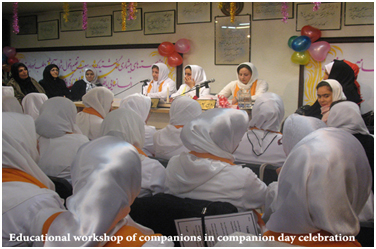
.jpg)
Now, for the role of guides. Congress60 is based on the principal of a rehabilitated addict helping other addicts who are still using drugs in addition to families supporting one another. A question might arise here: is anyone who has been rehabilitated a suitable candidate to help other addicts? We believe that an individual who has quit drugs instantaneously or as we say “free fall” can share his experiences with others. However, when a specific method of treatment is involved, one cannot help other addicts without the proper training.
We think of addiction as a science, especially where discussions of maintenance, treatment, recovery, and prevention are concerned. Thus, only a guide with proper training, knowledge, and experience together with a balanced mental and spiritual state can lend a helping hand to other addicts. Therefore, to determine the above-mentioned qualifications, we conduct oral and written examinations and look for a suitable moral attitude. If a guide gives the wrong instruction, it could have drastic consequences. We must be very cautious in regards to the process.
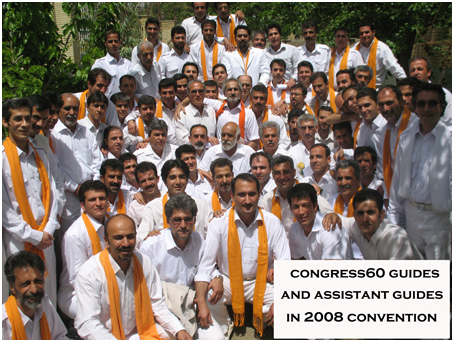
William White: What subjects are tested?
Hossein Dezhakam: We focus on three primary areas: 1) technical knowledge of drugs and their effects on humans and methods of effective treatment, 2) worldview or spiritual aspects of the recovery process, and 3) moral aptitude of the applicant, which is judged by the management team.
William White: What are the sources for the exams?
Hossein Dezhakam: The exams are based on knowledge drawn from a collection of my writings, including 1) Crossing the Zone 60 Degrees Below Zero, 2) Love, 14 Valleys for Recovery (similar to the 12 Steps of NA), 3) the manifest and principals of Congress60, 4) guide and guidance in Congress60 course, 5) worldview discourse 1& 2, and 6) numerous articles and educational CDs.
William White: What are the requirements that someone must have to become a guide?
Hossein Dezhakam: There are three different levels of guide in Congress60: 1) assistant guide, 2) guide, and 3) master guide. When an addict completes the entire treatment process successfully and achieves one full year of recovery, he is permitted to participate in the examinations for the role of assistant guide. The same applies to companions. Their addict must have achieved one full year of recovery. Upon attaining a good grade, they receive an orange scarf in a special ceremony, and they are allowed to form legions.
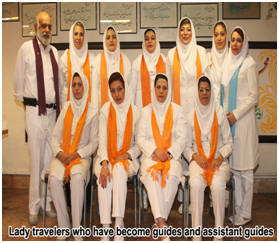
.jpg)
William White: What is the purpose of the orange scarf?
Hossein Dezhakam: It is a sign that distinguishes the guide in the educational workshops and makes it easier for the newcomers to find and choose the guide of their liking.
William White: What do you mean by legion?
Hossein Dezhakam: Each guide has several students, and we call this group a legion; it is similar to the family unit in a city and legions are like branches of a society. No one is permitted to be on his own in Congress60, and everyone must become part of a family or legion. Once the general workshop is over, every legion gathers around their respective guide and forms a smaller session. Thereafter, the guide assigns a topic for discussion and every member is expected to participate; every week, the guide is given permission to take his legion to a place in nature (not homes).
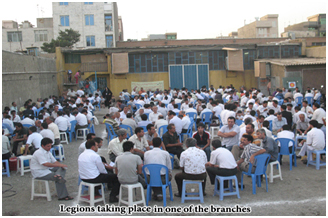
William White: Describe this guide role in more detail.
Hossein Dezhakam: In order to keep the cycles of training moving in Congress60, every assistant guide is allowed to volunteer his or her services for four years; after this period, he or she must either become a guide or stop accepting new students. The requirements for becoming a guide are: 1) at least three of his or her students must have reached the assistant guide status, 2) five other guides endorse his or her ability for the new position, and 3) he or she must submit a thesis concerning his or her experiences and findings in the field of addiction. After successfully completing these requirements, he or she becomes a guide and receives the blue scarf.
William White: How about the role of master guide?
Hossein Dezhakam: Up to now, there are no rules regarding this position. At present, I am the only master guide, though we hope to develop many more in the future. The master guide wears a purple scarf.
William White: How would you describe your role in Congress60?
Hossein Dezhakam: When I attempted to establish Congress60, conditions were difficult and many obstacles were in my path. However, as time went by and more members were cured by the DST method and maintained prolonged recovery, my personality gradually transformed into a charismatic figure for them and their families. This was because many hardcore addicts had been perfectly cured and their families witnessed an amazing transformation in their lives. They realized that everything I say or do was for their betterment, and this in turn gave me the opportunity to design a system based on knowledge, decency, and justice. I envisioned a model in my mind that would produce the highest results with the least amount of expenses and the lowest rate of relapse. Also, I enforced a strict code of independence at all levels so that no specific figure would have all the responsibilities alongside a powerful training and supervision process.
I’m happy to say that today Congress60 can continue the leap forward with minor adjustments even without me. These days, most of my time is spent on writing, research, communication with academic centers and NGOs, meeting with guests and visitors, playing sports, and supervising all the branches for improvements and enhancement of their operations.
I’m also the chair of the C14 even though my successor does most of the work. I’m also in charge of the female addicts and their training, which is a separate group altogether. There are no holidays in Congress60, and we always work.
Congress60 Literature
William White: Your writings have played a very important role within Congress60. Could you briefly describe your books and other writings and how they are used within Congress60?
Hossein Dezhakam: I created my writings to provide a new angle to look at drug addiction concepts and issues, and outlined this new way of understanding addiction and recovery in three books.
In my first book, “Crossing through the Zone 60 Degrees below Zero”, I compared addiction to extreme cold to give it a tangible feeling. The aim of this book is to shed new light on the process of treatment and recovery by defining the problem of addiction in depth. It states in simple language the obstacles faced by addicts, identifies the blind spots of current treatment methods, and presents new solutions. Research in this book has been presented in a way that most people can grasp the ideas. I think the place of this book is both in homes for the families and in university for the experts. Studying this book will be useful for doctors, judges, researchers, officials, and others active in the field.
In my second book, “Love, 14 Valleys for Recovery”, I expound on my belief that drug addiction damages the physical body, psyche, and worldview and that successful treatment requires a full renovation of the individual’s beliefs and views of himself, family, society, and the universe. Through addiction, one’s lenses are poisoned; one’s outlook on life is damaged. Thus, a vital transformation is required. I have designed 14 valleys or 14 steps for a change in this worldview, which would gradually give the addict an opportunity to mend his ways in order to attain peace and serenity within. The first valley begins with deep contemplation, and the fourteenth valley arrives at unconditional love.
In a third book, White Eagle, I outline my belief that drug addiction comes from a marriage between drugs and the person; thus, to treat and cure addiction, we must know and understand each component of this marriage. The book White Eagle is centered on the knowledge about human essence, a unique philosophy on this nature. It tries to pierce through the invisible attributes of humans and discover the secrets of its creation. The issues discussed include earthly and heavenly knowledge—physics and metaphysics. Of course, writing these 485 pages took approximately 14 years, and I could only share a part of my philosophy in regards to hidden aspects of the human being. The rest are written in two other books, “The General” and “Ashas”.
William White: Is there a brief summary of the valleys used by Congress60 members like the Twelve Steps that are used by members of Alcoholics Anonymous?
Hossein Dezhakam: Yes, we have the valleys in brief summary for members, and the fourteen valleys in C60 play the same role that the 12 Steps do for members of Alcoholics Anonymous.
Fourteen Valleys of Congress60
First Valley: All structures begin with contemplation; without contemplation, whatever exists will decline.
Second Valley: No creature comes into existence without a purpose; none of us are insignificant even if we think of ourselves as that.
Third Valley: It has to be known that nobody thinks as much as the human being for his Real self.
Fourth Valley: In crucial affairs, leaving the responsibility to God means neglecting one’s own responsibility.
Fifth Valley: Cognition is not the absolute power of solution in our realm of existence. It will be completed with experience and achievement.
Sixth Valley: We must fully perform Wisdom’s command as the commander in charge.
Seventh Valley: The mystery and secret in discovering the Truth lies in two factors: finding the right path and what we derive from it.
Eighth Valley: The path is revealed with progress.
Ninth Valley: When a force begins at a low level and gets to a higher degree, it reaches an endurance point.
Tenth Valley: Human beings’ past attributes don’t remain the same because we are constantly changing.
Eleventh Valley: All roaring rivers and gushing springs will ultimately reach the sea and ocean.
Twelfth Valley: In the end, the first command will be carried out.
Thirteenth Valley: The end of each point is the beginning of a new line.
Fourteenth Valley: The only thing that exists is Love, without it, there are only empty containers.
Funding and Staffing
William White: How is Congress60 funded? Does it receive any government funding?
Hossein Dezhakam: 99% of the funding for Congress60 comes from a donation box that is collected from all the participants at the end of each session voluntarily. Government funding is about $5,000 to $10,000 per year, and this is accepted only to have a good relationship with them. However, some buildings for our branches are provided by government or government-related organizations. The rest of these locations have been either rented or bought by our own money.
William White: What are the total number of staff and volunteer positions that support Congress60?
Hossein Dezhakam: This may be a bit surprising, but we have no paid staff at all, and all the positions are filled by part-time volunteers who include Didehban, Marzban, Guides, and Assistant Guides who collectively number more than 300.
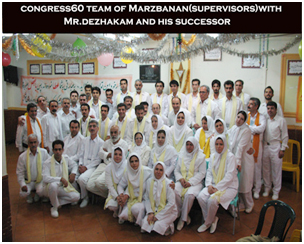
William White: Are there physicians or other professionals who supervise aspects of the support provided through Congress60?
Hossein Dezhakam: All the personnel who are in charge of training and education are graduates of congress60; they were either ex-addicts or family members of addicts. However, there are many university students who come to our branches to conduct their research and studies. Furthermore, some university instructors and professors attend our sessions to give talks and seminars, and all in all we have a very strong relationship with academic centers and universities.
Congress60 Members and the Public
William White: How do people find and become members of Congress60?
Hossein Dezhakim: In Iran, people generally know about Congress60, and we are faced with a great number of clients on a daily basis whom we have not the space and the facilities to serve. The travelers of Congress60 are in the view of the general public without any fear in a variety of means, such as TV interviews, newspapers and magazines, and sports arenas. Becoming a member of Congress60 is very easy as long as the individual obeys the rules and regulations of the workshops.
William White: Is this level of public visibility aimed at changing public attitudes toward addiction and recovery? This seems similar to what our recovery advocates are trying to do in the United States.
Hossein Dezhakam: Yes, we present the society with the opportunity to see a whole different side to treatment and recovery of drug addiction through TV, newspaper, magazine, radio, seminars, conventions, and sports arenas. This alters their perceptions and narrow-minded views on addicts. We believe that collateral damage is an inevitable outcome of any war, but bravery and courage can transform pessimistic predictions. Of course in this war, our weapons are love, faith, and reason.
Eleven years ago and for the first time as an addict, I participated in a live TV program with six other experts in the field and challenged many mainstream opinions on drug addiction. The results were unbelievable, and the path became clear after that night. I will try to summarize the main objectives.
1. If we compare the TV programs about addicts as a courtroom, it is usually the case where the judge, prosecutor, and jury are always present and the guilty verdict is always issued. Unfortunately, the accused being the addict is always absent and unable to offer any self-defense. For this courtroom (media) and the people who are the jury, we want to shine the light of knowledge and understanding on the dark corners of drug addicts and drug addiction.
2. Most people assume that an addict is a person of moral incompetence; he or she is a selfish and carefree individual who does not want to be treated and cured. We want to introduce a concept that says addiction is an illness of body, mind, and worldview and to be successfully treated, many issues must be taken into consideration.
3. We are aiming to challenge the false, futile methods of addiction treatment so as to prevent the vicious cycle of failures, which could harm the will and determination of those seeking redemption from addiction while opening a real, practical path to recovery.
4. We are saying that drug addiction is treatable and curable at any stage.
5. We believe that drug addiction knows no boundaries and no one’s children are safe from its destructive fire. We want to alert the public that those who use drugs recreationally today are the prime candidates to become tomorrow’s hardcore addicts.
6. We constantly remind the addicts about the grave mistake they have made while simultaneously offering the opportunity to make amends through the courageous act of entering into a treatment and recovery process.
7. Our goal is to create awareness in lawmakers and government officials about the actual nature of drug addiction so that they can make the right decisions that affect the addicts directly.
All in all, I would like to express my deepest joy in observing a similar courageous movement in the United Sates. I was very delighted to see the pictures of the National Recovery March in Philadelphia, and I admire you and every other person who participated in your recovery march.
William White: Do you serve a diverse population of members at Congress60?
Hossein Dezhakam: The doors of Congress60 are open to everyone regardless of gender, age, religious background, and personal beliefs. All are welcome here.
The Recovery Journey
William White: You have compared the treatment process and recovery to a journey.
Hossein Dezhakam: If addiction was only a physical or psychological disease, then treatment would be needed only in these areas. However, there is extensive damage done in another area, which I have named worldview. Worldview is the manner in which the individual looks and perceives himself, his family and friends, his social circles and interactions, and society. I believe the crisis faced by an addict has three aspects to it; this triangle has three sides, and all three have been damaged and must be repaired.
Therefore, to increase awareness and provide knowledge, some non-governmental organizations such as AA and NA have the 12 Steps in place in order to positively alter and transform the addict’s worldview. In a similar manner, I have written the 14 valleys for Congress60 so that the addict can better deal with the immense obstacles scattered on his or her path.
I can say from personal experience that an addict’s world is like a dark prison; one feels trapped inside the experiences of fear, anxiety, rage, humiliation, and lack of identity. In order to march towards light, health, and freedom, the individual must make a move. We call it a journey: a journey from fear to courage, from anxiety to bliss, from rage to compassion, from humiliation to honor, from sickness to becoming healthy.
William White: You mentioned that there are three journeys. Could you explain this?
Hossein Dezhakam: A person does not become an addict overnight; thus we cannot attempt to cure his addiction overnight. An individual would not be able to come out of darkness quickly, especially if he’s been in it for years. An immediate transition into light can metaphorically harm his eyes and thus, his vision (judgment). Essentially, time and the proper approach are needed to successfully treat this illness.
First Journey: the period of using drugs or substitute medicine until complete cessation. During the first journey, the three processes of maintenance, treatment, and recovery begin at the same time and after approximately 11 months; maintenance and treatment come to an end while recovery continues.
Second Journey: a drug-free period that comprises a process of self-discovery. At this stage, training and recovery are blended with physical exercise and activity such as sports competitions and gradually, the individual becomes familiar with his inner dormant strengths.
To receive the proper training and education, one year should be enough and he or she can volunteer in Congress60 part-time or even leave. However, gaining self-knowledge and awareness is an ongoing process, and it does not stop in the person’s lifetime. Usually, addicts who complete the first journey are through with addiction for good.
Third Journey: the never ending process of understanding the order and mystery of our universe. This stage involves a spiritual journey beyond time and place. Each and every one of us deals with this journey throughout our lives, and very few people could fully understand the actual depth of the matter. Congress60 is trying to say that gaining knowledge is a vital aspect of a human’s life. It must take place continuously and can never end because knowledge is infinite. Of course, to overcome drug addiction in Congress60, the first two journeys are sufficient, and the third journey is only an ideal destination.
William White: Who is qualified to teach worldview? To which science does it belong?
Hossein Dezhakam: Maybe a wise mentor or a philosopher who knows human nature and loves to serve; maybe someone who understands addicts and drug addiction and is able to love those he serves; or someone expert in human physiology, medicine, psychology, social sciences, and counseling. I’m not sure as to what field of science teaching worldview belongs to, maybe to all of them. Perhaps a new field should be created.
William White: So, where would we find such individuals?
Hossein Dezhakam: Such people are definitely out there, but we must train and educate certain people specifically to assist addicts in their journey of recovery. They might not become experts in the beginning but would make reliable guides. As you know very well, drug addiction is a science on its own and should not fall under other categories. As long as it does, we will not obtain the necessary results. Currently, drug addicts in need of assistance are the largest patient group globally, and yet, the method of treatment for addiction is still unclear and debatable. No one actually believes in a definite cure. It is upsetting that the addict is looked upon all too often as prey or a customer, although there are many honest activists in the field. We must one day accept that drug addiction requires a sophisticated science. We are just at the beginning of that. Other fields of science must work hand in hand with it rather than each wanting to own it. Imagine that in most places of the world, a general doctor who wishes to specialize in hair or skin must receive extensive training that could take five years. However, to receive a certificate for drug counseling and treatment, which is a complex matter, a relatively short time is required. It is my sole desire to establish a drug addiction academy with your aid and other interested parties so that the only subject of interest would be addiction and its cure.
Governance of Congress60
William White: How is Congress60 governed?
Hossein Dezhakam: As I mentioned earlier, our work forces are all part-time volunteers and our services are free of charge. We receive volunteer donations from our members. We have a federal system of government and management decisions are made at every level of our organization, given they are according to our written manifest and regulations. Management of every level is chosen in elections by the members, and its structure is similar to a green tree.
The root of the tree is the founder and director of Congress60. Since I was alone at the time of establishing this NGO and the original idea, structures, and rules were designed and implemented by me, I consider myself the architect and root of this tree.
The trunk of the tree is the Congress60 legislative branch or Didehbans (Watchman). This 14-member group act like a parliament (C14), and it is made up of 12 travelers and 2 companions who are experienced individuals with distinguished backgrounds. They are all guides in Congress60 as well and have been elected by other members. They are in charge of governing and managing all branches and right at the top of this hierarchy is the guardian of Congress60. Also, each Didehban, which means “supervisor” in English, has a responsibility for a specific field, similar to a minister in charge of a specific ministry, e.g., departments of research, worldview, family, public relations, lady travelers, sports, and guides. Every department has its own supervisor.
The main tree branches are the Marzbans (Border Patrol), which are the executive teams of every branch. The responsibility of running the branch and executing rules and regulations of Congress60 is on the shoulders of these individuals who are also elected by the members of that specific branch. They are chosen for one year, and the team is made up of five male travelers and two lady companions who are experienced in the field of addiction.
The smaller tree branches are the guides and assistant guides. This group of individuals has a very important responsibility, which is training and educating the addicts who have come to Congress60 to cure their addictions.
The blossoms and fruits of this tree (travelers) are connected to these branches, and they are in charge of producing fruits. The blossoms and fruits of the tree are the newcomers and first journey travelers. They are the most important part of Congress60; since strong winds and extreme cold might harm their progress, they need special care and attention to produce the best fruits. If this tree produces healthy and delicious fruits, the whole process becomes rewarding and sweet. However, if unhealthy and rotten fruits are produced, this tree must be cut, considering the cost and time. This tree must be cut and used in the fireplace in winter so that we can benefit from its heat and not waste our valuable energies.
William White: And what about the leaves?
Hossein Dezhakam: I haven’t actually found an appropriate role for the leaves yet. Perhaps they could represent the financial contributions of our members. Since the collection of leaves gives the tree a beautiful form, the sum of all these contributions makes a valuable asset.
William White: How long are members expected to participate in Congress60? Do those who have completed a cycle of weekly agendas continue to participate, or do they graduate from Congress60?
Hossein Dezhakam: In Congress60, all the stages of treatment, maintenance, and recovery are done in a form of two journeys, and the training workshops commence at 5:00 pm for about three and a half to four hours so the employed individuals can work during the day and participate in the training workshops in the evenings three times a week. The first journey: from using drugs to discontinue using. This course lasts for about one year. After this period, the individual doesn’t use any kind of substances or medicine and is trained under the supervision of his guide. After quitting drugs, he enters into the second journey. The second journey is from quitting drugs to knowing one’s self. At this stage, the process of treatment and maintenance has ended and the individual only works on his self and increases his knowledge in recovery; he fully participates in the public workshops and legions and repeats the training of the first journey. He becomes an exemplary model for those who are in the first journey and also he volunteers his services. After one year, he attains the necessary awareness and it’s not compulsory for him to participate in the workshops. At this time, the individuals who like to volunteer their services in C60 can do so as a counselor, assistant guide, guide, or marzban. They should make themselves ready for the oral and written examinations, and if they pass the exams, they will begin volunteering as an assistant guide.
William White: May anyone from the public attend these weekly sessions, or are they only for members of Congress60?
Hossein Dezhakam: Everyone can participate in the sessions as a guest, but some sessions are only for males and some sessions are only for females. There are four groups in C60: a) male addicts, b) female addicts, c) female companions: female family members like wife, mother, sister, and friend, and d) male companions: male family members like father, brother, son, and friend. Women cannot participate in the meetings that are especially for men and vice versa. There is a joint meeting for male travelers and male and female companions during the week, and on Fridays (weekend), male travelers and family members (male and female) from all branches come together in a huge park from 7:00 am to 2:00 pm and play sports activities in 14 different fields and participate in internal competitions.
William White: Do those who dedicate so much of their time to Congress60 on a voluntary basis have other occupations that allow them to financially support themselves and their families?
Hossein Dezhakam: All of our branches operate in part-time schedules. Some are open on odd days and others operate on even days, and they do so about 4 to 5 hours in the evenings. Therefore, no one besides me is full-time here. Those who volunteer more hours are obviously doing better financially. They are either students at home, retired individuals receiving pensions, or business people. Some are unemployed and look for a positive way to spend their free time; most of them are supported by their families, and some are given small donations by Congress60 for food and transportation on days they are volunteering. These donations are not considered salaries for their services since they are small and periodical.
Overall, Congress60 is like a social club for its members, offering a wide range of services in sports, hobbies, and arts. Most enjoy these services greatly and spend a few hours on alternate days socializing with their friends. They look forward to serving others and enjoy their time here since watching people change for the better is very exciting. Even our executive teams (Marzban) who are in charge of managing the branches share the working hours amongst themselves and every shift is allocated to one of them. The watchmen or the legislative branch of Congress60 are also part-time and volunteer according to their daily schedules. Our accounting and publications departments also follow this trend and manage their lives accordingly.
Some branches that offer morning counseling do so based on the free time of their volunteer staff, and all duties are shared by volunteers. Of course, there are always many young people who are unemployed and available in our branches who are begging for volunteer hours along with their family members. Some are willing to pay money to keep their young ones busy, so we are faced with a large number of available volunteers. All in all, everything is in a state of rotation in Congress60 and as soon as some volunteers leave, others take their places. I’m the only one full-time in Congress60 and am here only to do my own work and research, otherwise the management affairs are taken care of. If you ask about my own source of income, it is through the sales of my books and CDs, which is not a whole lot, but I make ends meet.
William White: What is the secret to maintaining the sustained involvement of the volunteer leaders within Congress60?
Hossein Dezhakam: What a great question, which is related to our seventh valley. Usually when organizations and institutions are looking to hire a strong work force, they choose those without criminal records or history of drug addiction (people with virtues). However, in Congress60, we hire people with the worst criminal backgrounds and addiction history (people with vices); this is our secret. They are the people who are banished from society and are even isolated by their friends and families. This is because Congress60 knows the secret in dealing with such individuals: we understand, respect, and love them and have realized the notion of personality transformation.
You know very well that if these so-called dangerous people change for the better, they could become valuable assets with great potentials and capabilities. This is because they have experienced the dark side and have suffered immensely and thus they appreciate the value of health and serenity. These individuals are very sharp and understand the slightest mistakes. It is like a righteous cop with an expert background in robbery. Such individuals have a lot of abilities and are willing to sacrifice a lot for their cause. Because they feel that Congress60 has rescued them from the depths of darkness and misery without asking for any financial repayment, they are willing to give back the unconditional love and service without any hesitation.
Since all who serve in Congress60 receive tremendous respect and admiration from other members, it establishes a deep spiritual relationship for them that satisfies an emotional need in them after years of humiliation and degradation. In Congress60, everyone accepts and respects the words of leaders and rewards them with gifts and flowers. This is our secret in creating and maintaining future leaders for Congress60: some are ready to stay and serve till the last moments of their lives so as to increase their knowledge, decency, and justice in life.
William White: Would money to establish full- or part-time paid staff help or potentially hurt Congress60?
Hossein Dezhakam: There are many non-governmental organizations (NGOs) worldwide that must maintain a paid staff policy to be able to operate, and I totally agree and understand this issue. People must have an income to live comfortably. However, I believe that it is better for Congress60 to operate on a volunteer basis so that those who do not need money enjoy the opportunity to serve with love and compassion. It is better that Congress60 continues as it is so that it can provide humanity the knowledge that its notorious members have gained through suffering and pain. This knowledge, which is available for all people, NGOs, universities, and academic centers, is gained by people who have gone to hell and returned. Everyone is welcome to use any part of it that they think is beneficial. I believe that if I pay salaries to our staff, it would bring more harm than good.
William White: How is it that you have such a large number of people willing to volunteer without demanding financial rewards?
Hossein Dezhakam: This is mainly because we treat and cure people free of charge, in a pleasant manner, without any expectation, and this in turn transforms the addicts’ lives and their families. Therefore, we are faced with a large number of volunteers who are ready to provide services and financially assist us in any way they can. Remember that not all drug addicts are street junkies. Many come from educated and well-off backgrounds, including experts, doctors, and artists. When they are successfully treated and regain their health, they do anything within their power to help our cause. For instance, several individuals who are drug-free now have provided us with land on which to build new branches. As soon as I announce in a meeting that Congress60 needs money, many volunteers come forward. It might be hard to believe, but if I say that I need five guides to go to a cold region and serve as volunteers, 20 people would immediately come forward even if they know they might die of cold over there. You might say that I have brainwashed them: no, never. This is because they have returned from the depths of darkness and understand the true meaning of unconditional love and service. There is a saying that we have: “others planted and we ate, we must plant for others to eat.” William, when a well is successfully dug to attain water, there would be prosperity and productivity in the nearby farms and gardens; life is enriched and food becomes available for all. However, if no water is found, only the diggers stand to gain financial rewards, and no one else benefits.
Recovery and Sport
William White: Sports play a unique role in Congress60. Could you discuss this?
Hossein Dezhakam: If sports are used properly in the issues of treatment and recovery, it could produce tremendous results. However, when implemented incautiously, it might bring more harm than good. Maybe it is for this specific reason that sports have yet to be accepted as instrumental factors in treatment and recovery of drug addiction.
We realized its importance in Congress60 through practical experience. We found out that with proper approach and suitable sports, we can take positive steps toward the recovery process. Therefore, we had to consider various types of sports and physical exercises so that each addict depending on his or her desire, ability, and interest could participate in them. This project began with light sports such as darts and evolved to full contact sports like rugby. When addicts are entered into our treatment process, they must go through a certain period of time before being allowed to participate in the sports program. At first, they start with light forms of activities so that their bodies can prepare the way for future training; they must gain the minimum balance and physical ability.
Currently, sports are so important in Congress60 that in order to become a guide, the individual must have a sport in which he or she is fully active. This condition is also compulsory for the companions and families. I must remind you that we do not have a lot of support or facilities to conduct our sports program. We gather on weekends in a large park, and everyone stays busy with their own physical workout. Maybe it is hard to believe that our soccer players play on hard asphalt, darts are conducted between the trees, and chess is played on park benches. Of course, due to the great improvement that our rugby and archery teams have had so far, they practice and compete in suitable stadiums, along with an Olympic size pool for our swimmers. We started with the poorest level of facilities and gradually, things improved. For instance, the current coaches of our rugby and archery teams have previously managed the national sides.
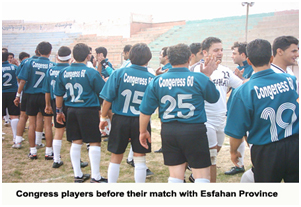
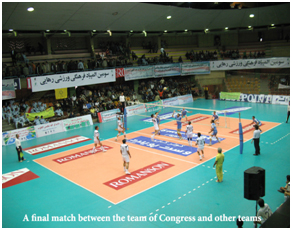
William White: Were sports always a part of Congress60? How did this begin?
Hossein Dezhakam: That’s a great question. We have arrived at this stage by accident and without planning or structural organization. Maybe it was destiny or fate. I’m not really sure, but I do know that overcoming the numerous obstacles on our path has been the main force that has guided our ship through the stormy seas. Approximately seven or eight years ago, our central branch was closed down and sealed by the order of a judge. As a result, more than five hundred people who were in the treatment process along with their families were left stranded. Instead of complaining or losing hope, guides formed their legions in a park and held their sessions there. Since there was a large space available in the park, some legions started to play football with a plastic ball during their free time. This was the beginning and foundation of sports in Congress60. At that same time, running the affairs of our central branch was conducted on the sidewalk in front of the closed doors.
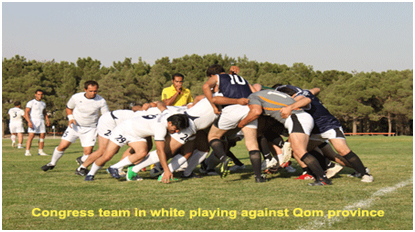
Fifty-four days later, another judge issued a verdict to reopen the central branch, and we all returned to business as usual. However, we all had gotten used to the atmosphere of the park, and we decided to continue the sports activities in the park on weekends. Gradually, volleyball came onto the scene and since there were many players, football and volleyball competitions between legions took place shortly after. After a couple of years, the city took away the asphalt ground and the other available spaces from us and ordered us to leave. Their reason was they wanted to build an archery field for archery competitions. Once again, we decided to take back our arena, so we registered for the archery training in that very location. After some time, we found ourselves in the national archery league competing against the best in the country. We also moved football to another area in the park.
Gradually, other sports were added and annual sports competitions and games such as Golden Eagle Olympics were established. This is the sixth year that these games are taking place. There are 14 different sporting events in these competitions, with more than one thousand athletes and their families participating. They are conducted from November until June and they end on World Anti-narcotics Day. Once these competitions are over, there are other games available for athletes such as Sardar cup, Raad cup, and White Eagle cup, with cash prizes for the winners.
William White: How many teams participate in the games?
Hossein Dezhakam: 24 football teams, 20 volleyball teams, 30 teams in tug of war, 200 players for table tennis, two rugby teams, 50 swimmers, and 80 archers.
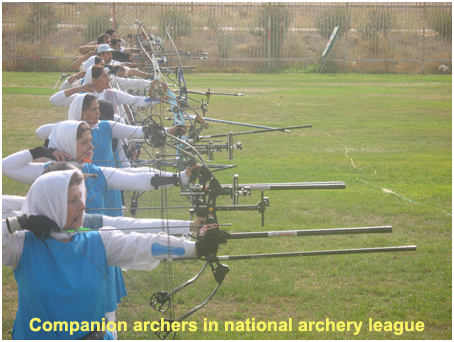
William White: What is your philosophy of the role of sports in addiction recovery?
Hossein Dezhakam: My philosophy regarding the role of sports in curing drug addiction is that it is best achieved as a gradual approach, with light activity in the beginning and full force after successful treatment and in recovery. A wise one once said “if you can, teach others how to love and serve; if not, give them hope. If there is nothing else you can do for them, at least make them busy; because doing nothing is the source of all corruptions.” In Congress60, I have made two concepts clear to my students for them to always remember in life. First is continuing their education, and the other is physical exercise or a field in sports.
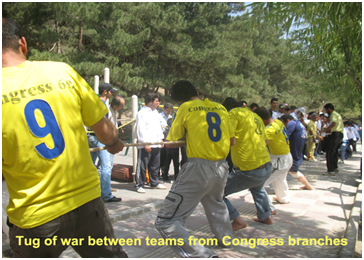
You probably agree with me that drug addiction shrinks the body, introverts the knees, slumps the shoulders and neck, and pales the skin complexion. Physical exercise and sports uproot the posture, prevent obesity, boost the opioid production within the body such as Dopamine and Endorphins, fill up the free time positively, enlighten the face and spirit of the individual and give a high motivation for life and living. This in my opinion gives them love and hope.
My dear friend William, it is now seven years that I get up at 5 in the morning three times a week and go to a swimming complex at 6:00 AM with about 100 members of Congress60 for a swim. When I watch these boys who were once hardcore drug addicts and street junkies dive into the water, play and laugh like children, I experience such a joy that is incomparable to anything in this universe. Yes, this is my philosophy; not only for addiction, but to be alive and to live life to the fullest.
William White: Do members continue to participate in the athletic events after completion of their formal involvement in Congress60?
Hossein Dezhakam: In Congress60, sports are usually taken up seriously after the treatment process and in recovery. I believe that every human being must take up some sort of a physical exercise to maintain good health and avoid the regular trips to the doctor. It is the most valuable, healthy, and yet cheapest form of entertainment available for humanity and a key factor in preventing revived addicts from going back into addiction.
Taking into consideration the trainings received in worldview, the length of the treatment and becoming familiar with sporting arenas and meeting healthy athletes, this is a solid foundation for the addicts to rely on. He or she becomes familiar with a new world and gradually leaves behind the old one and with it, the old addict friends and places. This happens in a smooth transition and it goes to an extent that he or she wonders to himself or herself “why did I ever have such friends and visit such places?” He or she realizes that it wasn’t him or her; that it was the drugs which made him or her go there and interact with those individuals.
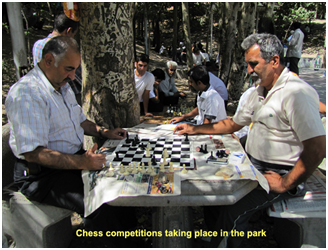
When someone wants to introduce himself in a meeting in Alcoholics Anonymous, he says: “Hi, my name is John and I’m an alcoholic. I’ve been sober 6 for months now.”
In Congress60, we say: “Hi, I’m John, a traveler; sporting field is rugby, the name of the guide, Johnson, treatment method DST, revival period 6 months.” This goes to show the importance of sports in our NGO; it becomes a part of one’s identity.
William White: How has the participation of members of Congress60 in public athletic events influenced public perceptions and attitudes toward addiction recovery in Iran?
Hossein Dezhakam: When addicts enter the treatment process in Congress60, they usually want to remain anonymous, and we also require no proof of identity from them. There are no limitations here, and everyone is free to hide or reveal their identity. However, an atmosphere of confidence has been created over the years where all the cured individuals are eager to reveal their identities to the public. They have no fear appearing in front of TV cameras and are eager to share their message of revival from drug addiction, talk about their personal experience, and challenge the false methods of treatments.
This movement has attracted the attention of reporters and TV producers towards Congress60. Naturally, this coverage is more intensified in sports arenas where yesterday’s hardcore addicts are the healthy champions of today. This is very surprising for people and officials, and they wonder how this transformation took place. I believe that when an addict reaches a stage of perfect cure from addiction, which includes a healthy physical and mental balance together with a confident recovery, they should take advantage of powerful forms of media to convey the promise of redemption from confinements of addiction. Instead of sharing their views with a small number of people in the meetings, they would reach a much greater audience of millions, including officials and experts. If they remain hidden, issues and obstacles that all addicts face, the right approach to treatment and recovery remains hidden and the addict’s achievements go unnoticed in the public eye. This is why, unlike much progress in finding cures for other diseases, there has not been the required advancement in addiction treatment plus the chaos of mismanagements in the clinics operating in the field.
Therefore, sporting arenas and championship standings are thus far the most profitable places for treatment and recovery of drug addiction along with being the means of distributing the right information. When in a sporting event, say rugby for example, a group of ex-hardcore addicts compete against other provinces and players who have never used drugs, and sometimes even win, people are amazed. When national teams organize friendly matches with our teams or Congress60 archery teams and bodybuilders compete in national leagues, there are incredible results achieved. When our champions on the medal podium announce that they were once a drug addict or inform the public of the proper approaches towards addiction, tremendous steps forward have been gained. Sports enjoy an organized system within Congress60 due to worldview trainings, mental and physical balance, and adaptation of proper social conducts.
A lot of local famous athletes visit our sporting competitions and become vocal in advocating our cause.
Recovery and the Arts
William White: Sports is just one of the arenas of recovery support in Congress60. Could you describe a few examples of the role of the arts in Congress60?
Hossein Dezhakam: We believe that besides the issues of treatment, recovery, and worldview, it is important that all individuals have meaningful activities—something that awakens their inner talents. Therefore, the arts are a fundamental aspect in our therapy. The power of sound and image assist words in our work. For example, theater and plays have played an instrumental role in our recovery process. We have been able to illustrate through the use of this media the obstacles regarding treatment and recovery for ourselves, society, and government officials. We have also been able to challenge the mainstream views of addiction while presenting its proper solution. Actors who have been cured in Congress60 have performed in venues, including our branches, streets, and prestigious halls across the country. We also have training materials for acting in our educational package for newcomers.
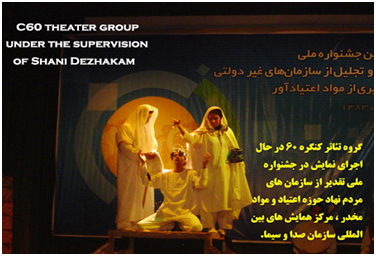
Another example of the use of the arts in recovery is our view on the role of music in recovery. We use specific songs and musical pieces composed by our members for special ceremonies. Song and music illustrate different stages of the recovery journey and celebrate recovery progress. We have various bands within Congress60 that perform different kinds of music for these occasions.
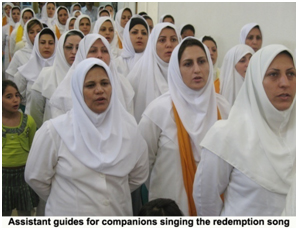
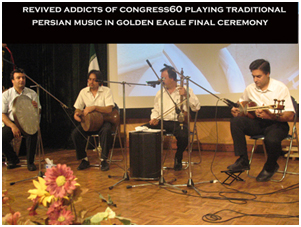
Recovery Advocacy and Family
William White: Recovery advocacy can be a drain personally and on the family. How does your family feel about all of the time Congress60 demands of you?
Hossein Dezhakam: All the members of my family are active in Congress60; my wife is the supervisor of the family department. My son (Amin), who is studying for his Masters in physics, is the supervisor of the worldview department. My eldest daughter (Ani), who holds a degree in biology, is the coach for the Congress60 archery team and is the number one seed in archery in Tehran; she is also a guide for the families. My other daughter (Shani), who is studying arts in the university, is in charge of arts in Congress60 and also a guide for the families. It is as if we live with Congress60, and we see it as a joyous occasion.
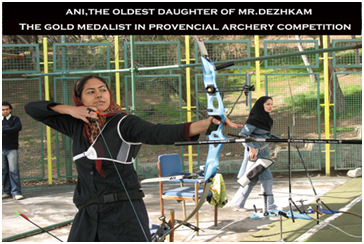
Final Reflections
William White: Are there any final words you would like to extend to our readers about Congress60 and your life’s work?
Hossein Dezhakam: Congress60 is a place where we conduct research about drug addiction and human nature and offer a hand to assist our fellow human beings. Its doors are always open to all people, and to international researchers, we extend our warmest welcomes.
Now that I look back on my life, I can see that I can divide it into three parts. The first part was spent in relative comfort and peace growing up, schooling, and work. The middle part was spent fighting the dark world, learning and coming into light. I’m currently in the third part, which I’m enjoying blissfully, and I’m doing my best to help more individuals come out of the darkness of addiction. I’m having a good life next to my warm family and good friends.
My dear colleague William, I’m pleased to have met you and established a wonderful collaboration with you. Although we are miles away, I appreciate your love, dedication, and honesty in serving others. And I thank you for opening a new door to me, a door to a vastness of our universe. Be as young and green as the valleys.
Those interested in more information may visit http://www.congress60.org/En-US/Default.aspx or email me at hosseindezhakam@yahoo.com.
William White: Mr. Dezhakam, thank you for your willingness to share your experience and the work of Congress60 with recovery advocates from around the world.
Acknowledgement: We would like to thank Saeed Moeini for the skilled translations that made this interview possible.